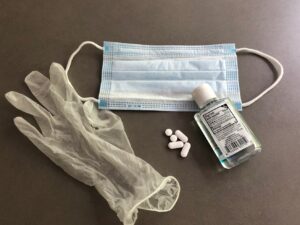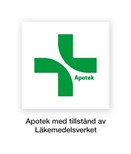Blog by Rui Liu, Susanne Lundin, Talieh Mirsalehi and Margareta Troein

Already in early spring 2020, Interpol reported that large amounts of falsified Covid-19 protection devices were in circulation.1 Now, in the beginning of 2021, the global spread of unapproved Covid-19 medicines – including vaccines – is on the rise.2 As our multi-disciplinary research group has long studied the prevalence of substandard and falsified medical products,3 we realized the importance of collecting data on how personal protection equipments against Covid-19 are spread, who has access to them and to what extent people are at risk of receiving falsifications.4
Sweden has one of the top Internet penetration rates worldwide,5 not least with regard to medical products. We therefore chose to focus on people’s digital consumption habits. Between September 2020 and January 2021, we conducted four cross-sectional surveys with Swedish residents. The surveys were administered by the Kantar Sifo survey consultancy,6 using their online panel consisting of roughly 100,000 participants recruited through random sampling. In each survey 1,000 respondents between the ages of 18 and 79 answered questions about if they had searched for Covid-19 protections online, what they had searched for and whether they had bought any such items. We also asked specifically whether they had checked if the websites were authorized pharmacies, and if the items on sale had the European Union logo for certified products or the Swedish version of it (see figure 2).

Our data shows that an increasing proportion of consumers had searched the Internet for Covid-19 protection from September 2020 to January 2021 (24% vs 34%). Most likely, part of the increase can be attributed to searches for personal tests for current infection and for vaccination opportunities. We also found that a higher proportion of the respondents had shopped protective goods online (28% vs 42%). In September 2020, 50% of those who had bought such items had neither checked the legitimacy of the selling sites nor the products. This proportion decreased to 37% in January 2021, which is an encouraging change.
However, not all groups were equally informed of the prevention of Covid-19 or aware of the risks. During the spring 2020 people living in socially disadvantaged areas, several of whom are asylum seekers, were particularly affected by Covid-19 related diseases and death.7 Different explanations have been suggested for this. One is language barriers and health literacy. This factor is particularly significant among immigrants who are illiterate or do not understand Swedish, posing challenges for the government to reach this social group. Another explanation is the overcrowded living condition many immigrants live in, presenting difficulties to isolate sick members of the family. Furthermore, working from home is often not possible for those in the service sector such as social workers, bus drivers, cleaners and shop assistants. On top of this, large gatherings at funerals, weddings and birthdays have been reported during the pandemic. For instance, in December 2020, 250 people gathered at a wedding party, against the recommendations issued by the government to limit the number of people at social events.8 9We see the difficulties of capturing the experiences of these groups through national representative surveys. More in-depth studies are needed to explore how people act and react to protect themselves and how people access Covid protection.
We have learned from our ongoing ethnographic research with asylum seekers from Syria and Afghanistan that there is a great need among these groups for advice on where they can acquire Covid-19 protection and wether they are entitled to vaccines.10 This marginalized social group is more likely to turn to people they attribute expertise to and whom they trust for advice on how to access Covid protection. For example, they turn to field workers in our project, or to their official contact persons in the Swedish community where they live. Some also share information about their own traditional medicines that are supposed to protect against disease and share advice on alternative Covid-19 protection.
To conclude, there is a great knowledge gap to capture consumption practices of different groups about how to obtain Covid-19 protection. More knowledge is needed about people’s perception and awareness of genuine and falsified medical protection. In light of our previous research involving different methods and empirical data,11 12 we have learned that acquiring this knowledge requires multidisciplinary collaboration.13 We therefore want to emphasize the importance of using a mixed-methods approach. As our preliminary data show, quantitative studies, in our case with population-based online surveys that ask about digital consumption, provide only one of many pictures of the reality, while our ethnographic fieldwork illuminate much more complex answers.
Author bio
Rui Liu is a doctoral student at the Department of Service Management and Service Studies, Lund University. Her research interests include people’s health consumption practices and emerging grey zones in the pharmaceutical market.
Susanne Lundin is a professor in ethnology at the Department of Arts and Cultural Sciences, Lund University, Sweden. Her research includes social and cultural aspects on health and medical technologies with a focus on moral and legal grey areas.
Talieh Mirsalehi is a doctoral student in ethnology at the Department of Arts and Cultural Sciences, Lund University, Sweden. Her doctoral research focuses on experiences of health, illness and medication in the migration context among children from different social and ethnic background in Sweden.
Margareta Troein is a professor in family medicine at the Department of Clinical Sciences Malmö, Lund University, Sweden. Her research includes medical, social and cultural aspects on health.
Works Cited
[1] Interpol. March 2020. Global operation sees a rise in fake medical products related to Covid-19. Available at https://www.interpol.int/en/News-and-Events/News/2020/Global-operation-sees-a-rise-in-fake-medical-products-related-to-COVID-19 (accessed 23 March, 2021)
[2] Interpol. March 2021. Fake Covid vaccine distribution network dismantled after Interpol alert. Available at https://www.interpol.int/en/News-and-Events/News/2021/Fake-COVID-vaccine-distribution-network-dismantled-after-INTERPOL-alert (accessed 23 March, 2021)
[3] Current projects: Falsified medicines in a multicultural society: Importance of knowledge exchange between the public and expertise and Why do we choose the Internet instead of the doctor next door? The Internet as a site for medicines in grey zones, financed by the LMK Foundation & the Marcus and Amalia Wallenberg Foundation (MAW).
[4] Lundin, Susanne & Liu, Rui. 2019. “‘Where and how do you buy medicines?’ A pilot survey of consumption strategies among the public in Sweden”. Journal of Public Health (Oxford, England). Doi: https://doi.org/10.1093/pubmed/fdz075
[5] OECD. 2018. OECD Reviews of Digital Transformation: Going Digital in Sweden, OECD Reviews of Digital Transformation, OECD Publishing, Paris. Available at https://doi.org/10.1787/9789264302259-en (accessed 25 March, 2021)
[7] Fallenius, Karin. April 2020. ”Foreign-born Swedish stand out in the statistics”. Available at https://www.svt.se/nyheter/lokalt/sodertalje/utrikesfodda-svenskar-sticker-ut-i-statistiken-folkhalsomyndigheten-ska-folja-utvecklingen (accessed 23 March, 2021)
[8] Hällsten, Amanda & Karlsson, Josefine. December 2020. ”Police was alarmed about a huge party – 250 guests”. Available at https://www.aftonbladet.se/nyheter/a/OQyGXA/polis-larmades-till-storfest–250-gaster (accessed 23 March, 2021)
[9] Swedish Public Health Agency. June 2020. Demographic Description of Confirmed Covid-19 Cases in Sweden from 13 March to 7 May (in Swedish, Demografisk Beskrivning av Bekräftade Covid-19 Fall i Sverige 13 Mars-7 maj 2020). Available at: https://www.folkhalsomyndigheten.se/contentassets/d6538f6c359e448ba39993a41e1116e7/covid-19-demografisk-beskrivning-bekraftade-covid-19-fall.pdf (accessed on 26 March 2021).
[10] LMK Stiftelsen. Falsified medicines in a multi-cultural society. Available at https://lmkstiftelsen.se/projekt/forfalskade-lakemedel-i-ett-mangkulturellt-samhalle/ (accessed 23 March, 2021)
[11] Funestrand, Henrik et al. 2019. “Substandard and falsified medical products are a global public health threat. A pilot survey of awareness among physicians in Sweden”. Journal of Public Health (Oxford, England). Doi: https://doi.org/10.1093/pubmed/fdy092
[12] Liu, Rui & Lundin, Susanne. 2020. “Medicines in the grey markets: A Sociocultural analysis of individual agency”. In: Hansson Kristofor & Irwin, Rachel, editors. “Movement of knowledge: Introducing a medical humanities perspective on medicine, science and experience”. Kriterium. Doi: https://doi.org/10.21525/kriterium.24.j
[13] Newton, Paul et al. 2020. COVID-19 and risks to the supply and quality of tests, drugs, and vaccines. The Lancet. Doi: https://doi.org/10.1016/S2214-109X(20)30136-4